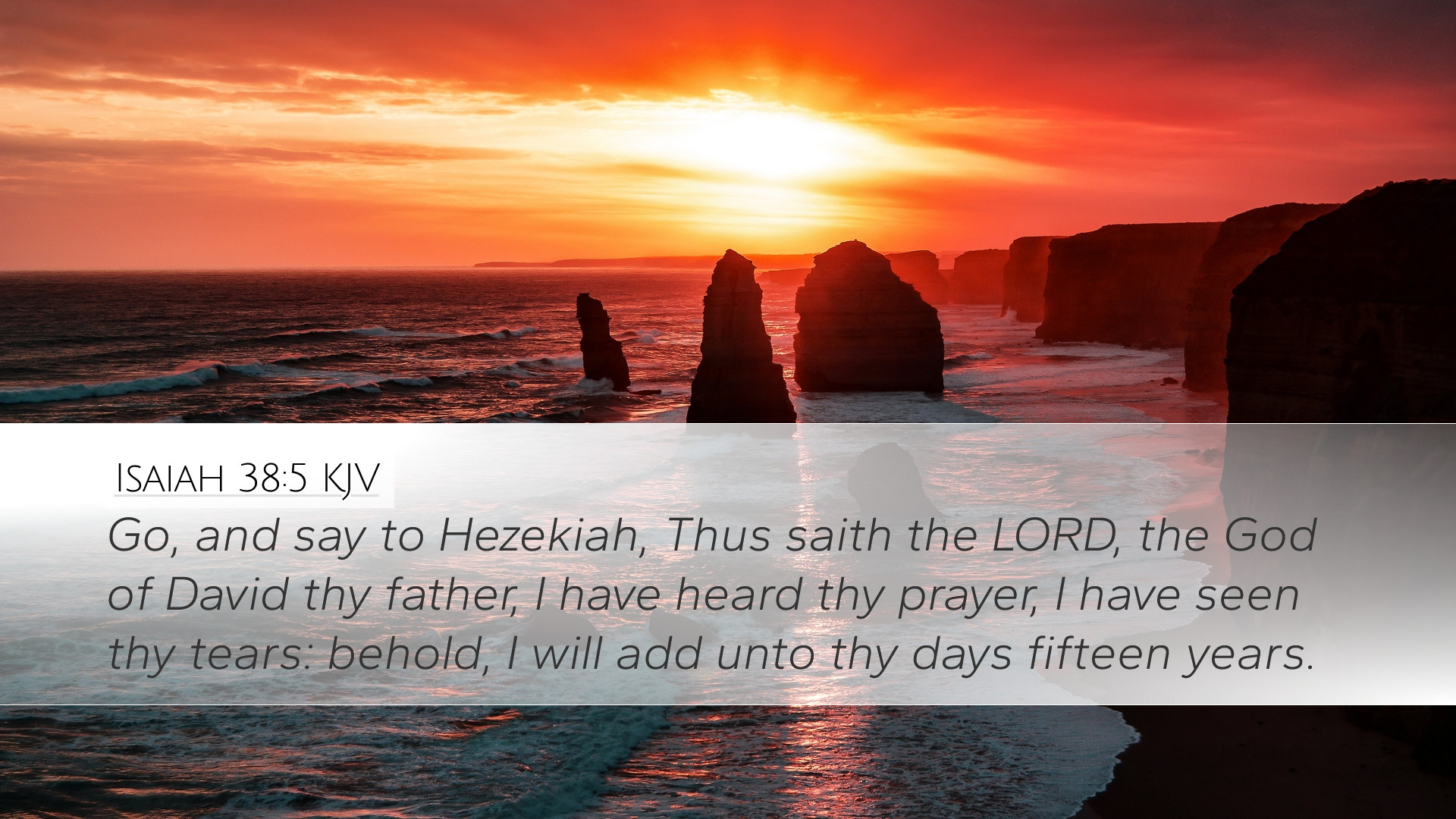Commentary on Isaiah 38:5
Isaiah 38:5 states:
“Go, and say to Hezekiah, ‘Thus says the Lord, the God of David your father: I have heard your prayer; I have seen your tears; behold, I will add fifteen years to your life.'”
Introduction
This verse encapsulates a profound moment in the life of King Hezekiah, illustrating God's responsiveness to prayer and the gracious extension of life. It reflects God's intimate involvement in the affairs of His people and serves as a poignant reminder of His mercy and power. This commentary draws insights from the works of esteemed theologians such as Matthew Henry, Albert Barnes, and Adam Clarke.
Contextual Background
Hezekiah, the king of Judah, was faced with a terminal illness. The context of Isaiah 38 is critical; it follows the narrative where Hezekiah, after receiving a dire prophecy from Isaiah regarding his impending death, turns to God in sincere prayer. This chapter emphasizes the role of prayer in the believer's life and the assurance that God hears the cries of the faithful among significant contentions. Henry's commentary elaborates on Hezekiah's character and his faithful leadership during turbulent times, while Barnes emphasizes the importance of personal supplication to God.
God's Response to Hezekiah
According to Matthew Henry, the declaration, “I have heard your prayer; I have seen your tears,” reflects God’s attentiveness to the cries of His people. This signifies a God who is not distant but rather actively engaged in the lives of those who seek Him earnestly. This portion of the verse emphasizes that God is aware of our struggles and emotions. As noted by Adam Clarke, the phrase also highlights the intersection between divine sovereignty and human need, underscoring that while God’s will is sovereign, human pleas are significant in His economy.
The Importance of Prayer
- Sincere Petition: The act of praying is presented as a powerful avenue of communication with God. Clarke emphasizes that Hezekiah’s prayer exemplifies genuine faith and desperation.
- Expression of Emotion: The mention of tears symbolizes deep emotional engagement with God. Barnes comments that tears may be seen as a language of sorrow that God understands and honors.
- Response of Faith: Hezekiah's initial response to his terminal prognosis was faith-filled supplication. Henry notes the efficacy of prayer when it is rooted in faith and accompanied by a life of righteousness.
Theological Implications
This verse reveals profound theological truths:
- God’s Promises: The promise to add fifteen years to Hezekiah’s life illustrates God’s power over life and death, demonstrating that God's promises are sure and transformative, as articulated by Henry.
- Mercy and Compassion: This moment encapsulates God’s merciful character. Clarke notes that God’s patience extends beyond mere justice, allowing for grace in response to faith.
- The Role of His People: The interaction between God and Hezekiah exemplifies how God’s purposes often involve the prayers of His people, a theme echoed throughout scripture.
Hezekiah’s Legacy
Beyond the miraculous healing, Hezekiah’s legacy is significant. As noted by Barnes, his reign was characterized by a return to true worship and a rejection of idolatry. The extension of his life allowed him to further his reforms and strengthen Judah against its enemies. Moreover, this incident taught both the people of Israel and future generations about the importance of steadfast faith in times of adversity.
Conclusion
Isaiah 38:5 serves as a powerful reminder of God’s intimate relationship with His people. The blend of divine sovereignty and human petition presents a profound theological understanding that reassures believers of God’s omnipotent presence and active engagement in life’s struggles. Pastors, students, theologians, and scholars alike can find in this passage a rich source not only for individual encouragement but also for the collective understanding of God’s enduring faithfulness and mercy.
Reflection Questions
- What can we learn from Hezekiah’s response to his dire situation?
- How does this text challenge us to approach God in prayer with sincerity and faith?
- In what ways does God’s response to Hezekiah exemplify His character as a compassionate and merciful deity?


